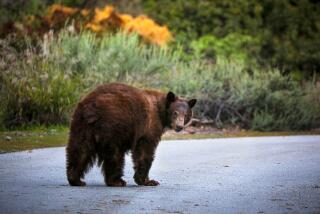Hunters Win Constitutional Cover
- Share via
There’s a tradition in North Dakota come winter: A few dozen sportsmen, shotguns at the ready, spread out in a giant circle up to four miles across. Slowly, they begin to walk in toward the center.
This dragnet is designed to flush out red foxes. Ten foxes, a dozen, maybe even 20, skitter out in front of the men. The circle tightens around them. The men then pull their triggers.
Reducing the fox population this way is vital, the sportsmen explain, because if foxes get too numerous, they’ll eat all the game birds and waterfowl that these same hunters want to shoot next season.
So the fox hunt has become a tradition. And not only that:
It’s become a bona fide constitutional right.
By an overwhelming vote, North Dakotans this month added a sentence to their state Constitution declaring hunting, fishing and trapping to be “a valued part of our heritage” that must “be forever preserved for the people.”
In other words, says state Sen. Bob Stenehjem, animal-rights activists are very definitely not welcome. Californians can eat tofu and wear organic cotton. North Dakotans will stick to beef and fur, thank you much. “We see what’s happening in the rest of the U.S., and we don’t want that to happen here,” Stenehjem said. “We like to hunt and fish. And we don’t see that it’s a problem.”
North Dakota is not alone on this one. Virginia passed a similar amendment this election. Minnesota has one too. So does Alabama.
Hunters, it seems, are sick of being demonized.
By enshrining their rights in the Constitution, they hope to make it tougher for animal-rights activists to mess with them. “This amendment ensures the rights of all citizens to hunt and fish and trap without harassment,” boasts Art Mielke, president of the North Dakota Wildlife Federation.
Pressed, Mielke concedes that--amendment or not--protesters still have a free-speech right to make a stink. But he can’t see why they would bother, now that 77% of North Dakotans have voted to elevate the taking of game to a constitutional right.
The way Mielke sees it, preserving hunting “for the public good,” as the amendment states, means quashing demonstrators like those who tried to disrupt the winter fox kill a few years back by scrambling into the center of the circle and screaming invectives at the shooters. It means taking to court activists like those who wrecked a recent fishing derby by dragging hooks through the water to tangle fishing lines.
It means, he says, “some judicial support” for sportsmen.
The activists, however, don’t seem too worried.
Indeed, in an odd way, some animal-rights enthusiasts even welcome the constitutional amendments as a sign that hunters feel threatened. “A desperate move on behalf of a small and whiny minority,” scoffed Lisa Lange, spokeswoman for People for the Ethical Treatment of Animals. “The popularity of hunting is on the decline. This is not going to change that.”
Added Wayne Pacelle, senior vice president of the Humane Society: “It’s a feel-good measure.”
Some activists even suggest the amendments could backfire. The North Dakota and Virginia measures, for instance, stipulate that hunting, fishing and trapping can be regulated by state authorities.
“So you can envision a time when public sentiment turns against hunting, and the state could pass a law banning it,” suggested Jeff Leitner of the Fund for Animals.
Stenehjem acknowledged that concern, saying he was wary that North Dakota’s amendment--which calls for hunting to be managed “for the public good”--might “put someone’s foot in the door for over-regulation.”
Still, he’s pleased with the new line in his Constitution.
After all, North Dakota was settled by trappers. The first white men to come through the territory were explorers financed by fur companies. Even today, farm boys trap fox and coyote, raccoon and muskrat, beaver and mink, selling the pelts for some spending cash.
Hunters, especially those who love to go after ducks and birds, find North Dakota a paradise, if a chilly one. And fishing? State Sen. Jack Traynor predicts that someone soon will reel in a world-record perch from Devils Lake in the northeast part of the state.
Leitner may sniff that it’s inappropriate to single out one recreational activity in a state Constitution. (“You don’t have golf in there,” he says.)
But in North Dakota, harvesting game is more heritage than hobby, more lifestyle than leisure. To Stenehjem, Traynor and their constituents, a constitutional amendment is a proud statement indeed.
“We want it to be known that we intend to hunt, fish and trap here in North Dakota,” Stenehjem says. “To be honest, that’s what keeps a lot of people up here.”
More to Read
Sign up for Essential California
The most important California stories and recommendations in your inbox every morning.
You may occasionally receive promotional content from the Los Angeles Times.













